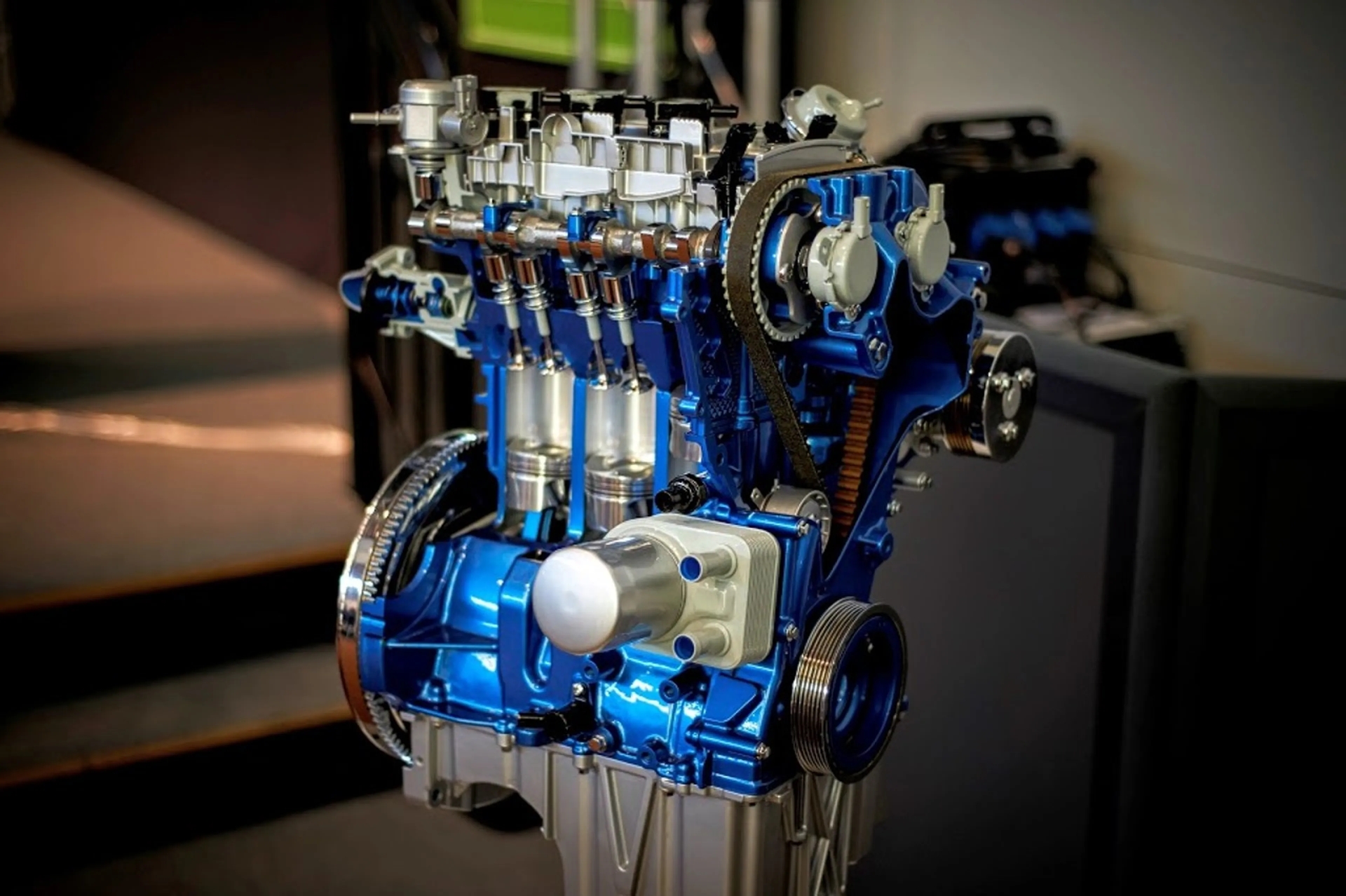
1.0 EcoBoost motor sorunları
Canlı yayınlarda ilgili ilan gönderdiğiniz vakit temkinli yaklaştığım ve mümkün mertebe alternatiflerine yönlendirdiğim otomobillerden bir başkası, 1.0 EcoBoost taşıyan Ford'lar. Daha evvel 1.2 PureTech makalemizde bahsettiğimiz şekilde triger kayışı gene yağ içinde çalışan (2018-19'a kadar, sonraki yıllarda zincire geçildi) bu motor, minik hacmi dolayısıyla devamlı yüksek stres altında çalışması sebebiyle, pek çok soruna gebe.
Ford’un 1.0L EcoBoost motoru 2012'de piyasaya sürülen, turboşarjlı ve direkt enjeksiyonlu, üç silindirli bir ünite. Markanın Fiesta, Focus, Puma, EcoSport, C-Max, Mondeo ve Transit Connect modellerinde kullanıldı. Bu motor 2018'de (Fiesta'da geçiş 2020'den itibaren) yeniden tasarlandı: Silindir kapakları arasındaki akış tersine çevrildi, silindir deaktivasyonu eklendi ve ıslak kayış yerine zincir kullanıldı (fakat yağ pompası hala ıslak kayış ile çalışıyor). Eski modellerde turbo önde yer alırken, revize edilen modellerde turbo arka tarafta. Gelin birlikte teknik detaylarını inceleyelim:
- Önceki Versiyonlar: 99 hp, 123 hp, 138 hp.
- Sonraki Versiyonlar: 125 hp, 140 hp, 155 hp (mild hibrit).
Teknik Özellikler:
- Turboşarj: BorgWarner KP39 turbo.
- Silindir Kafası: Entegre egzoz manifoldu, daha hızlı ısınma ve verimlilik sağlıyor.
- Yakıt Enjeksiyonu: 1500 barın üzerinde direkt enjeksiyon.
- Soğutma Sistemi: Elektrikli su pompasıyla ayrılmış soğutma sistemi.
Bu motor aslında, gene aynı PureTech'te olduğu gibi, kendi kategorisinde (1-litre altı) 2012'den 2017'ye dek 6 sene üst üste Uluslararası Yılın Motoru ödülünü kazandı. Ancak o makalede de belirtmiştik:
Bu ödüller otomotiv gazetecileri tarafından, verimlilik–performans dengesine ve kullanılan teknolojilere bakılarak verildiği için, sorunsuzlukla herhangi bir ilgileri yok.
Bunu da zaten, ödülleri topladığı senelerde çıkardığı problemler nedeniyle konu olduğu geri çağırmalardan anlayabiliriz:
1. Soğutma Sistemi Arızaları (2017-2018): Soğutma hortumlarının çatlaması ve sızıntı yapması, motorun aşırı ısınmasına neden oldu ve bazı durumlarda motor yangınlarına yol açtı. Özellikle 2011-2014 modellerde bu sorun daha yaygın görüldü ve geri çağırmalar yapıldı. Ford, bu problemi çözmek için soğutma hortumlarını değiştirdi ve motor sıcaklığını izleyen yazılım güncellemeleri sağladı.
2. Yağ Pompası Arızaları (2018-2019): Yağ pompasındaki tasarım hataları, bazı modellerde yağın yeterince dolaşamamasına ve motorun ciddi şekilde zarar görmesine yol açtı. Bu sorunlar için de geri çağırmalar yapıldı.
Toparlamak gerekirse; yaygın sorun ve çözümleri:
1. Soğutma Suyu Kaçakları ve Aşırı Isınma: Silindir kafasında meydana gelen çatlaklar ya da hatalı hortumlar soğutma suyu kaçaklarına yol açabiliyor. Bu da motorun aşırı ısınmasına ve blok çatlaklarına neden olabiliyor. Özellikle 2011-2014 modellerde yaygın görülüyor.
- Çözüm: Soğutma hortumları ve silindir kafasının düzenli kontrolü; gerektiğinde değiştirilmesi.
2. Islak Kayış Deformasyonu: Yağ içinde çalışan bu kayış, erken aşınarak yağı kirletebiliyor ve motor hasarına yol açabiliyor. Bu, motorun aşırı gürültü yapmasına veya yatak sarmasına neden olabiliyor.
- Çözüm: Kayışın erken değiştirilmesi ve düzenli olarak kontrol edilmesi.
3. Turboşarj Sorunları: Turbonun yağ besleme sorunları ya da mekanik arızalar nedeniyle gücünü kaybetmesi yaygın. Yetersiz yağlama turbo arızasına yol açabiliyor.
- Çözüm: Turboşarj ve yağ hatlarının düzenli kontrolü ve gerektiğinde değiştirilmesi.
4. Yakıt Basıncı Düşüklüğü: Yüksek sıcaklıklarda yakıt enjeksiyon pompaları zarar görebiliyor ve bu da motorun teklemesine ya da kapanmasına yol açabiliyor.
- Çözüm: Yakıt enjeksiyon sistemi ve kam kovası kontrolü, arızalı parçaların değiştirilmesi.
5. Yağ Pompası Arızaları: Yağ pompası tasarım hatası nedeniyle bazı motorlarda yağ eksikliği yaşanabiliyor ve bu da motorun hızla yıpranmasına yol açıyor.
- Çözüm: Yağ pompasının ve yağ basıncının düzenli kontrolü; sorunlu parçalarda erken müdahale.
Ford 1.0L EcoBoost, 2018-2019 sonrası güncel versiyonları bilinçli kullanıldığında ve düzenli bakım yapıldığında sorun çıkarmayabilir; ancak bilhassa ilk versiyonlarda karşılaşılan problemler titiz yaklaşım ve erken müdahale gerektirmekte.
Kaynaklar:
https://www.slashgear.com/1581215/ford-1-0l-ecoboost-engine-common-problems-issues/
https://ksbautostyling.co.uk/ford-1-0-ecoboost-engine-problems/
https://www.trents.co.uk/blog/common-ford-1-litre-ecoboost-engine-problems
https://www.clickmechanic.com/blog/common-problems-with-the-ford-ecoboost-engine/


6 Yorum